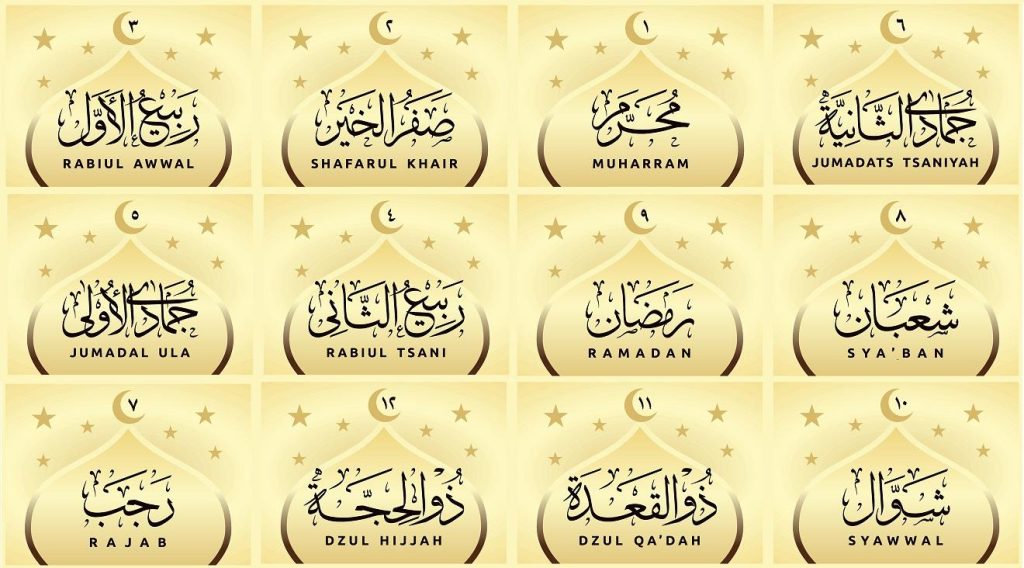Islamic Months
Meaning of Islamic months - Islamic Calendar - Important Islamic Dates - Islamic Hijri Calendar - Islamic months names and significance
Islamic Months - Islamic Months Names - Islamic Calendar
The Islamic calendar, also known as the Hijri calendar, is a lunar calendar used by Muslims around the world to determine the dates for Islamic events and observances. The Islamic calendar consists of twelve months, each with its own significance and blessings. In this article, we will discuss each of the Islamic months and their importance in Islamic tradition.
Muharram:
Muharram is the first month of the Islamic calendar and is considered to be one of the most sacred months in Islamic tradition. The 10th day of Muharram, known as Ashura, marks the day when Prophet Musa (Moses) (peace be upon him) and the Children of Israel were saved from Pharaoh and his army. It is also the day when Prophet Muhammad’s (peace be upon him) grandson, Imam Hussain (may Allah be pleased with him), was martyred in the Battle of Karbala. Muslims fast on the 9th and 10th days of Muharram to commemorate these events.
Safar:
Safar is the second month of the Islamic calendar and is believed to be a month of trials and hardships. There are some cultural beliefs that associate Safar with bad luck, but there is no religious basis for such beliefs. Muslims are encouraged to seek Allah’s protection and blessings during this month.
Rabi’ al-Awwal:
Rabi’ al-Awwal is the third month of the Islamic calendar and marks the birth of the Prophet Muhammad (peace be upon him). It is celebrated as a major Islamic holiday, known as Mawlid al-Nabi. Muslims around the world organize celebrations and events to honor the life and teachings of the Prophet during this month.
Rabi’ al-Thani:
Rabi’ al-Thani is the fourth month of the Islamic calendar and is considered to be a quiet and peaceful month. There are no major Islamic events or observances during this month.
Jumada al-Awwal:
Jumada al-Awwal is the fifth month of the Islamic calendar and marks the beginning of the spring season. There are no major Islamic events or observances during this month.
Jumada al-Thani:
Jumada al-Thani is the sixth month of the Islamic calendar and is also known as Jumada al-Akhira. There are no major Islamic events or observances during this month.
Rajab:
Rajab is the seventh month of the Islamic calendar and is considered to be one of the sacred months in Islamic tradition. Muslims are encouraged to increase their worship and seek Allah’s forgiveness during this month. The 27th night of Rajab is believed to be the night when the Prophet Muhammad (peace be upon him) ascended to the heavens, known as Isra and Mi’raj.
Sha’ban:
Sha’ban is the eighth month of the Islamic calendar and is considered to be a month of preparation for the upcoming month of Ramadan. Muslims are encouraged to increase their worship and seek Allah’s forgiveness during this month. The 15th night of Sha’ban, known as Laylat al-Bara’ah or Shab-e-Baraat, is believed to be a night of forgiveness and mercy.
Ramadan:
Ramadan is the ninth month of the Islamic calendar and is considered to be the most sacred month in Islamic tradition. It is the month when the Quran was revealed to the Prophet Muhammad (peace be upon him). Muslims around the world observe fasting during this month, from dawn until sunset. The last ten days of Ramadan are particularly significant, as they include Laylat al-Qadr, the Night of Power, which is believed to be better than a thousand months.
Shawwal:
Shawwal is the tenth month of the Islamic calendar and marks the end of the month of Ramadan. Muslims celebrate the festival of Eid al-Fitr at the end of Ramadan, which is a joyous occasion that involves praying, feasting, and exchanging gifts.
Dhu al-Qidah:
Dhu al-Qidah is the eleventh month of the Islamic calendar and is considered to be one of the sacred months in Islamic tradition. Muslims are encouraged to increase their worship and seek Allah’s forgiveness during this month. The 8th day of Dhu al-Qidah is known as Yawm al-Tarwiyah and marks the beginning of the Hajj pilgrimage to Mecca.
Dhu al-Hijjah:
Dhu al-Hijjah is the twelfth and final month of the Islamic calendar and is also considered to be one of the sacred months in Islamic tradition. It is the month when the Hajj pilgrimage takes place in Mecca, and millions of Muslims from around the world travel to Saudi Arabia to perform the pilgrimage. The 10th day of Dhu al-Hijjah, known as Eid al-Adha, marks the end of the Hajj pilgrimage and is a major Islamic holiday.
The Islamic months hold great significance and importance in the lives of Muslims. Each month has its own blessings, and Muslims are encouraged to increase their worship and seek Allah’s forgiveness during these months. The Islamic calendar serves as a reminder for Muslims to keep their faith strong and to remain connected to Allah throughout the year.

